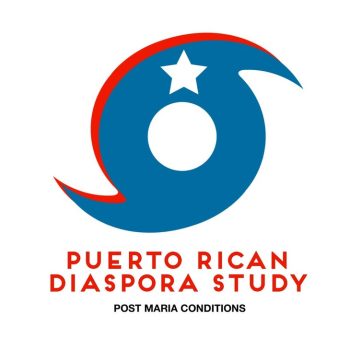The different dimensions of response and relief in the aftermath of Hurricane María are being explored as part of a new Penn State project.
Alexis Santos, director of graduate studies in applied demography and research affiliate of Penn State’s Population Research Institute, grew up in Puerto Rico and says he is very excited about launching the project to assist his home country. “It is my hope to help Puerto Ricans, both on the island and in the U.S., address the ongoing crisis by providing data that can potentially help them reach out to policy makers and organizations involved in the ongoing relief efforts.”
The project focuses on four aspects of the post-Hurricane María conditions: reestablishment of communications with family members still in Puerto Rico, an assessment of relief efforts, impact of aid received by family members from diverse organizations, trust in the official information and organizations, and potential impact of Hurricane María to current migration dynamics.
“This is the first study of its kind and involves complex strategies to reach the Puerto Ricans in the U.S. using social networks, and is well on its way to becoming the largest study of the target population in both the pre- and post-Hurricane María period,” Santos explained. “This project also revisits the long history PRI has concerning the population of Puerto Rico.”
Previously, under the leadership of Nancy Landale, Liberal Arts Research Professor Emerita of Sociology and Demography, PRI launched the project “Puerto Rican Maternal and Infant Health Project 1994-2000,” which is to this day the largest study of its kind to collect information from mothers living in the U.S. and Puerto Rico.
As for the current project, Santos aims to contribute and aid the discussion by providing information about the state of affairs through the best source of information available in the aftermath of Hurricane María, family members of those left behind. A preliminary report will be shared with the Puerto Rican research and policy communities by mid-November. “The exciting part of this project is that it can aid in the policy side by providing information to those in decision-making roles,” he said.
Santos received his doctorate in demography from the University of Texas at San Antonio before coming to Penn State, where he has served as director for the Applied Demography program and assistant teaching professor for the past two years.
The project is supported by Penn State’s Sociology and Criminology Department and the Population Research Institute, part of the Social Science Research Institute at Penn State.
Article posted from Penn State News

The different dimensions of response and relief in the aftermath of Hurricane María are being explored as part of a new Penn State project.
Alexis Santos, director of graduate studies in applied demography and research affiliate of Penn State’s Population Research Institute, grew up in Puerto Rico and says he is very excited about launching the project to assist his home country. “It is my hope to help Puerto Ricans, both on the island and in the U.S., address the ongoing crisis by providing data that can potentially help them reach out to policy makers and organizations involved in the ongoing relief efforts.”
The project focuses on four aspects of the post-Hurricane María conditions: reestablishment of communications with family members still in Puerto Rico, an assessment of relief efforts, impact of aid received by family members from diverse organizations, trust in the official information and organizations, and potential impact of Hurricane María to current migration dynamics.
“This is the first study of its kind and involves complex strategies to reach the Puerto Ricans in the U.S. using social networks, and is well on its way to becoming the largest study of the target population in both the pre- and post-Hurricane María period,” Santos explained. “This project also revisits the long history PRI has concerning the population of Puerto Rico.”
Previously, under the leadership of Nancy Landale, Liberal Arts Research Professor Emerita of Sociology and Demography, PRI launched the project “Puerto Rican Maternal and Infant Health Project 1994-2000,” which is to this day the largest study of its kind to collect information from mothers living in the U.S. and Puerto Rico.
As for the current project, Santos aims to contribute and aid the discussion by providing information about the state of affairs through the best source of information available in the aftermath of Hurricane María, family members of those left behind. A preliminary report will be shared with the Puerto Rican research and policy communities by mid-November. “The exciting part of this project is that it can aid in the policy side by providing information to those in decision-making roles,” he said.
Santos received his doctorate in demography from the University of Texas at San Antonio before coming to Penn State, where he has served as director for the Applied Demography program and assistant teaching professor for the past two years.
The project is supported by Penn State’s Sociology and Criminology Department and the Population Research Institute, part of the Social Science Research Institute at Penn State.
Article posted from Penn State News